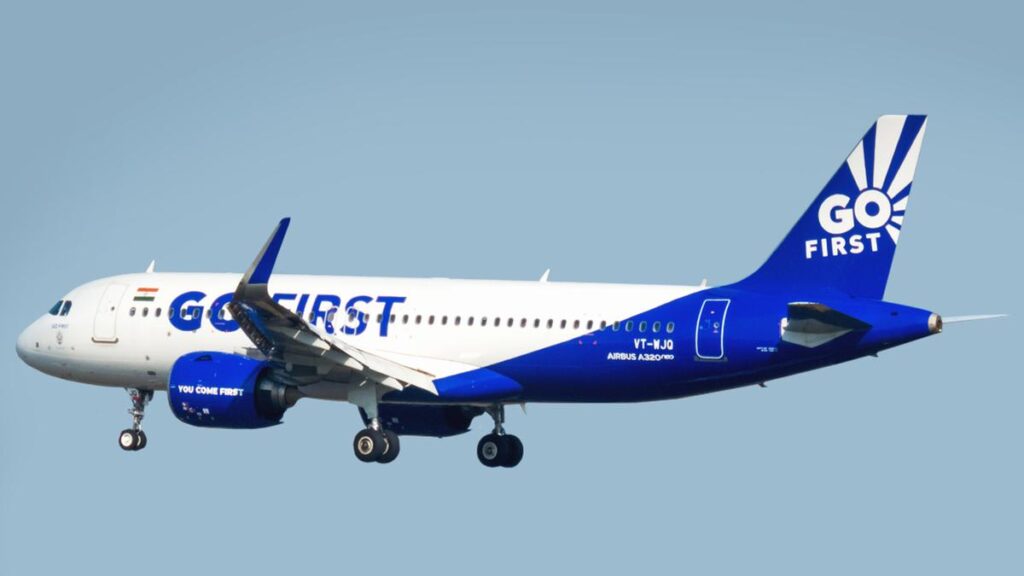The Engine Controversy Behind Go First’s Bankruptcy Application
On Wednesday, Go Airlines (India) Ltd was granted bankruptcy protection, providing an opportunity for the budget carrier to reevaluate its debts and contracts. The airline had grounded approximately half of its fleet due to alleged faults in the Pratt & Whitney engines. Go First, the airline highlights the significance of the geared turbofan (GTF) engines manufactured by the U.S. engine maker. These engines are identified as the central factor contributing to the crisis.

PROBLEM START
In 2016, Go First welcomed its initial A320neo aircraft, equipped with GTF engines, following an order for 72 narrow-body jets from Airbus. Pratt & Whitney serves as the exclusive engine supplier for Go First’s A320neo aircraft fleet.
The selection of these engines by Go First was based on several factors. Firstly, the U.S. company, competing with CFM International, presented more favorable fleet-management terms. Additionally, the GTF engines gained recognition for their enhanced fuel efficiency, reduced noise levels, and lower service requirements.
However, despite Pratt’s substantial $10 billion investment in the development of the GTF engines, certain issues emerged. These included problems with the fan blades, an oil seal, and the combustion chamber lining.
The complications with the GTF engines led to the grounding of numerous A320neo planes in 2017, merely a year after their launch. In India alone, both IndiGo and Go First, prominent customers of the A320neo aircraft, had to ground up to 12 planes at a single point in time, resulting in the cancellation of numerous flights.
Go First, an airline company claimed that in 2017, Pratt & Whitney agreed to compensate them for engine “support.” Under this agreement, which lasted until 2019, Go First received unspecified compensation for the days when their planes were grounded due to engine replacements or maintenance.
WHAT NEXT?
However, in 2020, Go First encountered more frequent and severe engine failures. This led to financial disputes arising between Go First and Pratt & Whitney in 2022 regarding the arrangement for engine replacement and maintenance.
In February 2023, Pratt & Whitney proposed a plan to provide replacement engines at a rate that was four times lower than the previous failure rate. This proposal prompted Go First to file for emergency arbitration in Singapore a month later.
During the arbitration process, Pratt & Whitney’s legal team argued that their engines were not defective, although they may not have performed as expected. They also contended that Go First’s financial troubles were a result of their own actions and that the airline owed Pratt & Whitney over $100 million.
Go First stated that the percentage of aircraft affected by “faulty engines” had increased from 7% of their fleet in December 2019 to 50% in December 2022. This significant increase in engine-related issues resulted in a loss of 108 billion rupees ($1.3 billion) in revenue and additional expenses for the airline.
Pratt & Whitney affirmed their commitment to the success of their airline customers and emphasized their dedication to meeting delivery schedules for all customers.
In February, Greg Hayes, the CEO of Raytheon Technologies Corp, the parent company of Pratt & Whitney, acknowledged that the reliability of GTF engines had not met expectations. He assured the company was actively addressing and resolving these problems.
Jefferies analyst Prateek Kumar states that IndiGo, the largest airline in India and a significant customer of A320neo aircraft, is encountering a comparable issue with Pratt engines affecting a portion of its fleet. However, the airline has managed to handle the crisis more effectively than others due to its significantly larger fleet size and improved vendor negotiations.
Also, Read:
Private & Non-scheduled Charter operators in India
Go through, the Mall of Aviation
For the best HELIPAD CONSULTANCY



